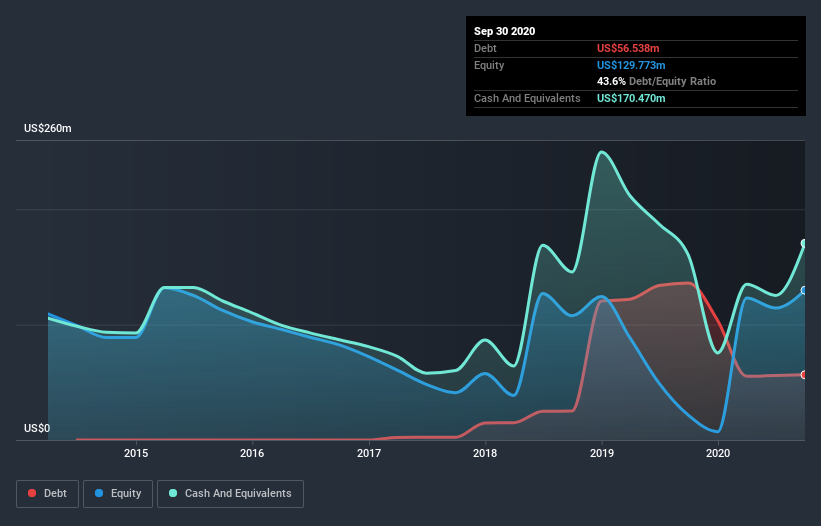- United States
- /
- Biotech
- /
- NasdaqCM:VSTM
Health Check: How Prudently Does Verastem (NASDAQ:VSTM) Use Debt?

Legendary fund manager Li Lu (who Charlie Munger backed) once said, 'The biggest investment risk is not the volatility of prices, but whether you will suffer a permanent loss of capital.' When we think about how risky a company is, we always like to look at its use of debt, since debt overload can lead to ruin. We can see that Verastem, Inc. (NASDAQ:VSTM) does use debt in its business. But the more important question is: how much risk is that debt creating?
What Risk Does Debt Bring?
Debt assists a business until the business has trouble paying it off, either with new capital or with free cash flow. Ultimately, if the company can't fulfill its legal obligations to repay debt, shareholders could walk away with nothing. However, a more common (but still painful) scenario is that it has to raise new equity capital at a low price, thus permanently diluting shareholders. Of course, the upside of debt is that it often represents cheap capital, especially when it replaces dilution in a company with the ability to reinvest at high rates of return. The first thing to do when considering how much debt a business uses is to look at its cash and debt together.
Check out our latest analysis for Verastem
What Is Verastem's Net Debt?
You can click the graphic below for the historical numbers, but it shows that Verastem had US$56.5m of debt in September 2020, down from US$136.1m, one year before. But on the other hand it also has US$170.5m in cash, leading to a US$113.9m net cash position.

How Strong Is Verastem's Balance Sheet?
Zooming in on the latest balance sheet data, we can see that Verastem had liabilities of US$37.7m due within 12 months and liabilities of US$50.3m due beyond that. Offsetting this, it had US$170.5m in cash and US$5.69m in receivables that were due within 12 months. So it actually has US$88.2m more liquid assets than total liabilities.
It's good to see that Verastem has plenty of liquidity on its balance sheet, suggesting conservative management of liabilities. Because it has plenty of assets, it is unlikely to have trouble with its lenders. Succinctly put, Verastem boasts net cash, so it's fair to say it does not have a heavy debt load! When analysing debt levels, the balance sheet is the obvious place to start. But ultimately the future profitability of the business will decide if Verastem can strengthen its balance sheet over time. So if you want to see what the professionals think, you might find this free report on analyst profit forecasts to be interesting.
Over 12 months, Verastem reported revenue of US$22m, which is a gain of 43%, although it did not report any earnings before interest and tax. With any luck the company will be able to grow its way to profitability.
So How Risky Is Verastem?
We have no doubt that loss making companies are, in general, riskier than profitable ones. And the fact is that over the last twelve months Verastem lost money at the earnings before interest and tax (EBIT) line. Indeed, in that time it burnt through US$49m of cash and made a loss of US$87m. However, it has net cash of US$113.9m, so it has a bit of time before it will need more capital. With very solid revenue growth in the last year, Verastem may be on a path to profitability. Pre-profit companies are often risky, but they can also offer great rewards. The balance sheet is clearly the area to focus on when you are analysing debt. But ultimately, every company can contain risks that exist outside of the balance sheet. We've identified 3 warning signs with Verastem (at least 1 which is a bit unpleasant) , and understanding them should be part of your investment process.
If you're interested in investing in businesses that can grow profits without the burden of debt, then check out this free list of growing businesses that have net cash on the balance sheet.
If you’re looking to trade Verastem, open an account with the lowest-cost* platform trusted by professionals, Interactive Brokers. Their clients from over 200 countries and territories trade stocks, options, futures, forex, bonds and funds worldwide from a single integrated account. Promoted
New: Manage All Your Stock Portfolios in One Place
We've created the ultimate portfolio companion for stock investors, and it's free.
• Connect an unlimited number of Portfolios and see your total in one currency
• Be alerted to new Warning Signs or Risks via email or mobile
• Track the Fair Value of your stocks
This article by Simply Wall St is general in nature. It does not constitute a recommendation to buy or sell any stock, and does not take account of your objectives, or your financial situation. We aim to bring you long-term focused analysis driven by fundamental data. Note that our analysis may not factor in the latest price-sensitive company announcements or qualitative material. Simply Wall St has no position in any stocks mentioned.
*Interactive Brokers Rated Lowest Cost Broker by StockBrokers.com Annual Online Review 2020
Have feedback on this article? Concerned about the content? Get in touch with us directly. Alternatively, email editorial-team (at) simplywallst.com.
About NasdaqCM:VSTM
Verastem
A development-stage biopharmaceutical company, focuses on developing and commercializing drugs for the treatment of cancer in the United States.
Flawless balance sheet low.


